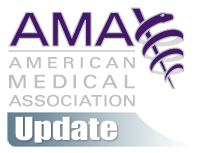Trip to the Hill
Report from 2013 AMA interim meeting
Kate Alfano, CMS contributing writer

Physician delegates and leadership representing the Colorado Medical Society traveled to Washington, D.C. in November to lobby the congressional delegation on Medicare physician payment and participate in the 2013 American Medical Association Interim Meeting.
CMS leaders met with U.S. Sens. Mark Udall and Michael Bennet, and U.S. Reps. Mike Coffman, Ed Perlmutter and Doug Lamborn, and the staffs of U.S. Reps. Cory Gardner, Diana DeGette and Jared Polis on Nov. 19. CMS leaders urged the delegation to repeal the SGR to make the Medicare program sustainable for patients and physicians.
Congressional lawmakers considered bipartisan and bicameral Medicare payment transitions in the closing weeks of this session and the AMA announced its support for the proposals before the U.S. House Ways and Means Committee and the U.S. Senate Finance Committee, calling them “a significant improvement over current law” that will “result in a stronger Medicare program.”
The AMA correctly reported that it was unlikely Congress would reach an agreement before the end of the year and that lawmakers will need to adopt a short-term patch for early 2014 as they work out the details, with the biggest obstacle being the need to find budgetary offsets for both a patch and a permanent fix. The Congressional Budget Office has re-scored the cost of repealing the SGR over the next 10 years from $150 billion to $116.5 billion, which AMA President Ardis Hoven, MD, said presents an opportunity for repeal that will not likely occur again.
As CMS members heard in their meetings with lawmakers, all Colorado congressional delegation members support the SGR repeal and several are actively working to make the transition a reality. (Note: Both committees passed the proposal in mid-December and Congress passed the temporary patch.)
The AMA House of Delegates adopted numerous policies on important topics that impact the stability of physician practices, quality of care and the advancement of patient health.
The Colorado delegation brought forth a resolution, approved by the CMS House of Delegates in September, to put in place a two-year “implementation period” for ICD-10 during which payers would not be allowed to deny payment based on specificity of ICD-10 diagnosis. Payers would be required to provide feedback for diagnosis determined to be incorrect. If unsuccessful in negotiating with payers, the resolution directs CMS to seek legislation to establish this implementation period.
Colorado also brought forth a resolution on prepayment review by third parties. CMS directed the AMA to work with payers to stop the insurer practice of delaying payments by asking for documentation to review prior to payment, and to work with payers to establish rules to continue to allow the payer to conduct prepayment documentation review if the payer has performed a post-payment documentation review and proven that the provider has been submitting incorrect claims. Should efforts to work with payers to end the practice of delaying payments without reasonable justification fail, CMS directed the AMA to seek legislation to accomplish this.
Delegates voted nearly unanimously to support a draft congressional framework that would repeal the SGR, while continuing to advocate for future positive payment updates and the inclusion of alternative payment models developed by organized medicine.
Three policies addressed the appropriate availability and use of medications. The first gives a contemporary review of national drug control policy and calls for a variety of changes, including developing community-based prevention programs for at-risk youth and increasing the accessibility of treatment programs for substance use disorders. The second aims to address opioid-associated overdoses and deaths by directing the AMA to develop a set of best practices to inform clinical use of these drugs in managing pain and calling for the Centers for Disease Control and Prevention to collect more robust data on unintentional opioid poisonings and deaths. And the third asks the Joint Commission to reevaluate its accreditation standard for pain management.
CMS Immediate Past President Jan Kief, MD, participated on a panel at the Organization of State Medical Association Presidents covering states’ experiences with the insurance exchanges. “Dr. Kief demonstrated that Colorado excels in bringing together stakeholders of varying philosophies to produce an exchange product that is not perfect but has both patients and payers participating actively,” said Lynn Parry, MD, a past president of CMS. Kief awaits official nomination from the AMA Board in April for a position that she seeks on the Council on Constitution and Bylaws for June 2014.
Young Colorado physicians continued to have a large presence on the national stage. Resident Carolynn Francavilla, MD, brought forth two policies from the Resident-Fellow Section. Steve Sherick, MD, chair of the AMA Young Physician Section, directed the assembly and meeting for young physicians nationally and passed two resolutions that he lead-authored, one on cost transparency and one on AMA membership dues being discounted by national medical malpractice companies. And Nikesh Bajaj, a third-year student at Rocky Vista University College of Osteopathic Medicine, was elected to a position as a Medical Student Delegate to the AMA representing Region 1.
Thanks to the members who attended the meeting: Nikesh Bajaj; John L. Bender, MD, FAAFP; Jeffrey Cain, MD; Dave Downs, MD; Dean Drizin; Andrew Flynn; Brendan Fowler; Carolynn Francavilla, MD; Jan Kief, MD; Mark Laitos, MD; Jeremy Lazarus, MD; Katie Lozano, MD; Lee Morgan, MD; Tamaan Osbourne-Roberts, MD; Ray Painter, MD; Lynn Parry, MD; Paul Pukurdpol; Brigitta Robinson, MD; Alisa Sherick, MD; Steve Sherick, MD; Ted Timothy; and Allison Wood.
Posted in: Colorado Medicine | Initiatives | AMA

Comments
Please sign in to view or post comments.